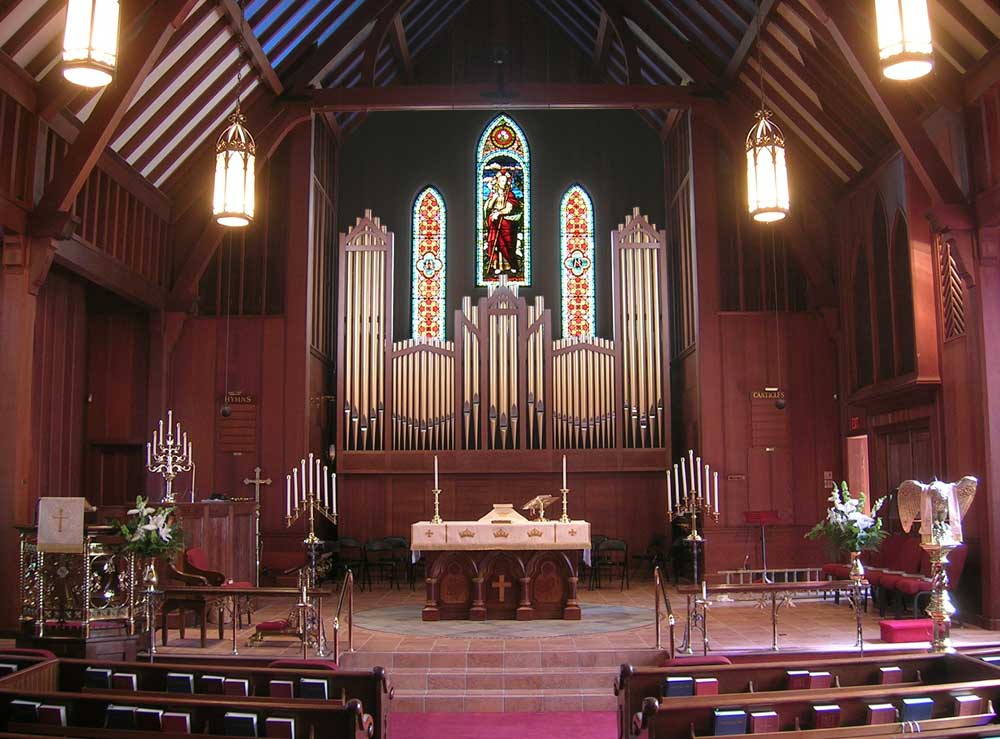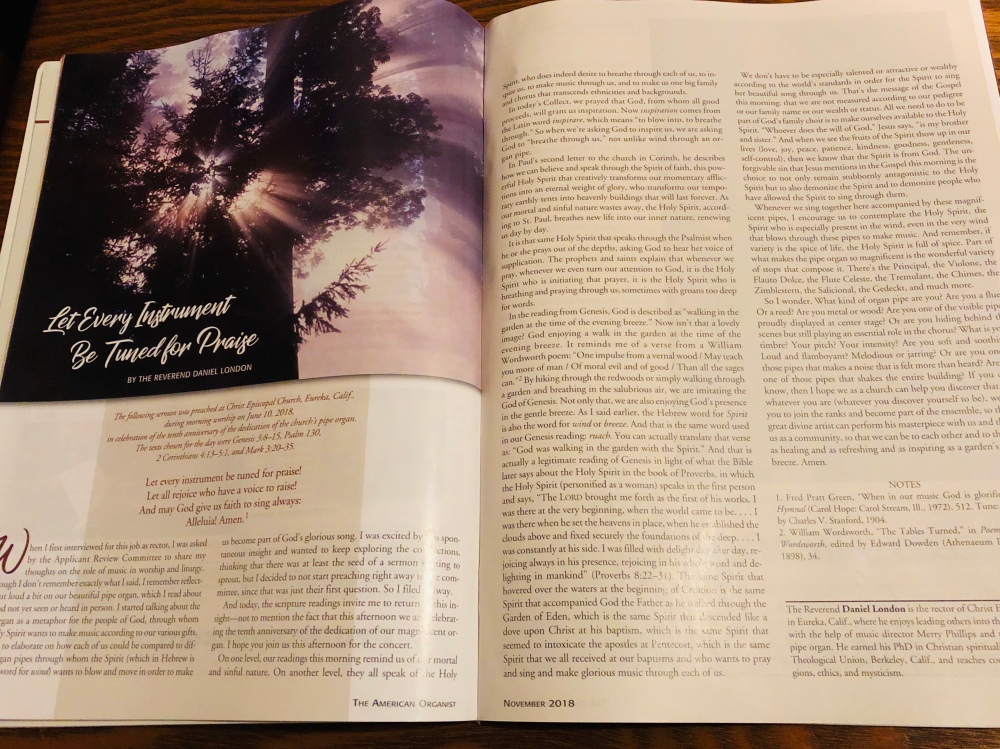Readings for the Third Sunday After Pentecost
Genesis 3:8-15
Psalm 130
2 Corinthians 4:13-5:1
Mark 3:20-35
This sermon was preached by the Rev. Daniel London, Ph.D. at Christ Episcopal Church in Eureka CA on June 10, 2018
Let every instrument be tuned for praise!
Let all rejoice who have a voice to raise!
And may God give us faith to sing always:
Hallelujah! Amen.[1]
When I first interviewed for this job as rector, I was asked by the ARC (the Applicant Review Committee) to share my thoughts on the role of music in worship and liturgy. Although I don’t remember exactly what I said, I do remember two things. I remember singing to the ARC (through Skype) a Hebrew song that I previously used in a sermon, a song inspired by Psalm 133: Hine Ma Tov Uma Nayyim Shevet Achim Gam Yachad, which means “Behold how good it is when brothers and sisters dwell together in unity!” (the first verse of Psalm 133). I found out later that Fr. Doug Thompson also sang during his interview so I was in good company.
The second thing I remember is reflecting out loud a bit on the beautiful Kegg Pipe Organ, which I learned about but had not yet seen or heard in person. I started talking about the pipe organ as a metaphor for the people of God through whom the Holy Spirit wants to make music according to our various gifts. I started to elaborate a bit on how each of us could be compared to different organ pipes through whom the Spirit (which in Hebrew is the same word for wind) wants to blow and move in order to become part of God’s glorious song. I was excited by this insight and wanted to keep exploring the connections, thinking that there was at least a seed of a sermon starting to sprout, but I decided to not start preaching right away to the committee since that was just their first question. So I filed it away.
And today, the Scripture readings invite me to return to this insight, not to mention the fact that this afternoon we are celebrating the 10th anniversary of the dedication of our magnificent Kegg Pipe Organ. So I hope you join us this afternoon at 3 PM.
On one level, our readings this morning remind us of our mortal and sinful nature. On another level, they all speak of the Holy Spirit who does indeed desire to breathe through each of us, to inspire us, to make music through us and to make us one big family and chorus that transcends ethnicities and backgrounds.
In our Collect, we prayed that God, from who all good proceeds, will grant us inspiration. Now “Inspiration” comes from the Latin “inspirare” which means “to blow into, to breathe through.” So when we’re asking God to inspire us, we are asking God to “breathe through us,” not unlike wind through an organ pipe.
In Paul’s second letter to the church in Corinth, he describes how we can believe and speak through the Spirit of faith, this powerful Holy Spirit that creatively transforms our momentary afflictions into an eternal weight of glory, who transforms our temporary earthly tents into heavenly buildings that will last forever. As our mortal and sinful nature wastes away, the Holy Spirit, according to Paul, breathes new life into our inner nature, renewing us day by day.
It is that same Holy Spirit that speaks through the Psalmist when he or she prays out of the depths, asking God to hear her voice of supplication. The prophets and saints explain that whenever we pray, whenever we even turn our attention to God, it is the Holy Spirit who is initiating that prayer, it is the Holy Spirit who is breathing and praying through us, sometimes with groans too deep for words.
In the reading from Genesis, God is described as “walking in the garden at the time of the evening breeze.” Now isn’t that a lovely image? God enjoying a walk in the garden at the time of the evening breeze. It reminds me of a verse from a William Wordsworth poem: “One impulse from a vernal wood / may teach you more of man / Of moral evil and of good / Than all the sages can.”[2] By hiking through the redwoods or simply walking through a garden and breathing in the salubrious air, we are imitating the God of Genesis. Not only that, we are also enjoying God’s presence in the gentle breeze. As I said earlier, the Hebrew word for Spirit is also the word for “wind” or “breeze.” And that is the same word used in our Genesis reading: ruach. You can actually translate that verse as: God was walking in the garden with the Spirit. And that is actually a legitimate reading of Genesis in light of what the Bible later says about the Holy Spirit in the book of Proverbs, in which the Holy Spirt speaks (personified as a woman) in the first person and says, “The LORD brought me forth as the first of his works. I was there at the very beginning, when the world came to be…I was there when the he set the heavens in place, when he established the clouds above and fixed securely the foundations of the deep…I was constantly at his side. I was filled with delight day after day, rejoicing always in his presence, rejoicing in his whole word and delighting in mankind.” (Proverbs 8:22-31). The same Spirit that hovered over the waters at the beginning of Creation is the same Spirit that accompanied God the Father as he walked through the garden of Eden, which is the same Spirit that descended like a dove upon Christ at his baptism, which is the same Spirit that seemed to intoxicate the apostles at Pentecost, which is the same Spirit that we all received at our baptism and who wants to pray and sing and make glorious music through each of us.
We don’t have to be especially talented or attractive or wealthy according to the world’s standards in order for the Spirit to sing her beautiful song through us. That’s the message of the Gospel this morning: that we are not measured according to our pedigree or our family name or our wealth or status. All we need to do to be part of God’s family choir is to make ourselves available to the Holy Spirit. “Whoever does the will of God,” Jesus says, “is my brother and sister.” And when we see the fruits of the Spirit show up in our lives (love, joy, peace, patience, kindness, goodness, gentleness, self-control), then we know that the Spirit is from God. The unforgivable sin that Jesus mentions in the Gospel this morning is the choice to not only remain stubbornly antagonistic to the Holy Spirit but to also demonize the Spirit and to demonize people who have allowed the Spirit to sing through them.
Whenever we sing accompanied by these magnificent pipes, I encourage us to contemplate the Holy Spirt, the Spirit who is especially present in the wind, even in the very wind that blows through these pipes to make music. And remember, if variety is the spice of life, the Holy Spirit is full of spice. Part of what makes the pipe organ so magnificent is the wonderful variety of pipes that compose it. There’s the principal, the violone, the flauto dolce, the flute celeste, the tremulant, the chimes, the zimblestern, the salicional, the gedeckt and much more.
So I wonder what kind of organ pipe are you? Are you a flue? Or a reed? Are you metal or wood? Are you one of the visible pipes proudly displayed at center stage? Or are you hiding behind the scenes but still playing an essential role in the chorus? What is your timbre? Your pitch? Your intensity? Are you soft and soothing? Loud and flamboyant? Melodious or jarring? Or are you one of those pipes that makes a noise that is felt more than heard? Are you one of those pipes that shakes the entire building? If you don’t know, then I hope we as a church can help you discover that. And whatever you are (whatever you discover yourself to be), we need you to join the rank and become part of the ensemble so that the great divine artist can perform his masterpiece with us and through us as a community, so that we can be to each other and to the world as healing and as refreshing and as inspiring as a garden’s evening breeze. Amen.

[1] Fred Pratt Green, “When in Our Music God is Glorified,” Psalter Hymnal (Carol Hope: Carol Stream IL, 1972), 512. Tune: Engelberg by Charles V. Stanford, 1904.
[2] William Wordsworth, “The Tables Turned” in Poems by William Wordsworth, edited by Edward Dowden (Athenaeum Press: Boston, 1898), 34.

